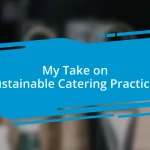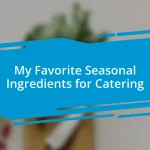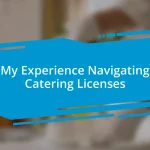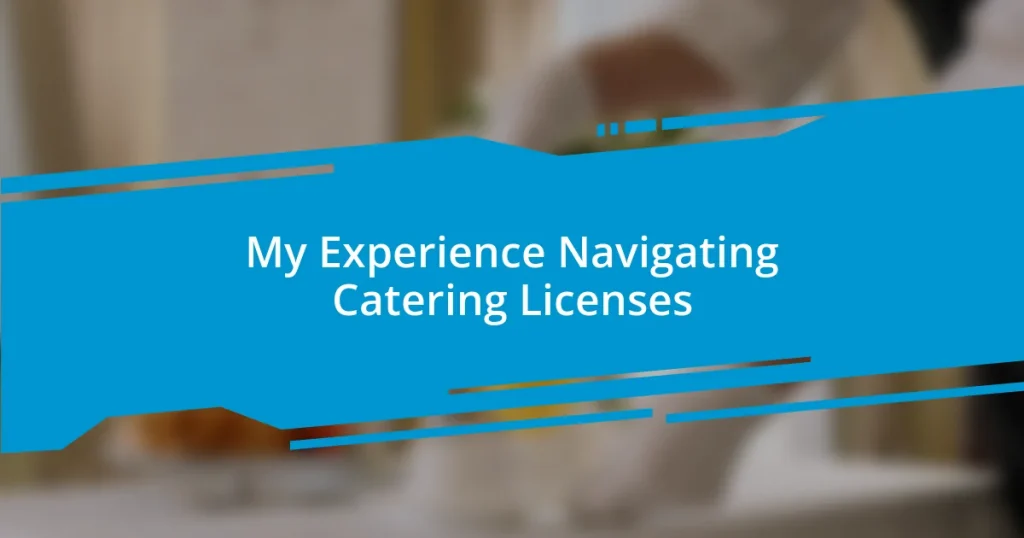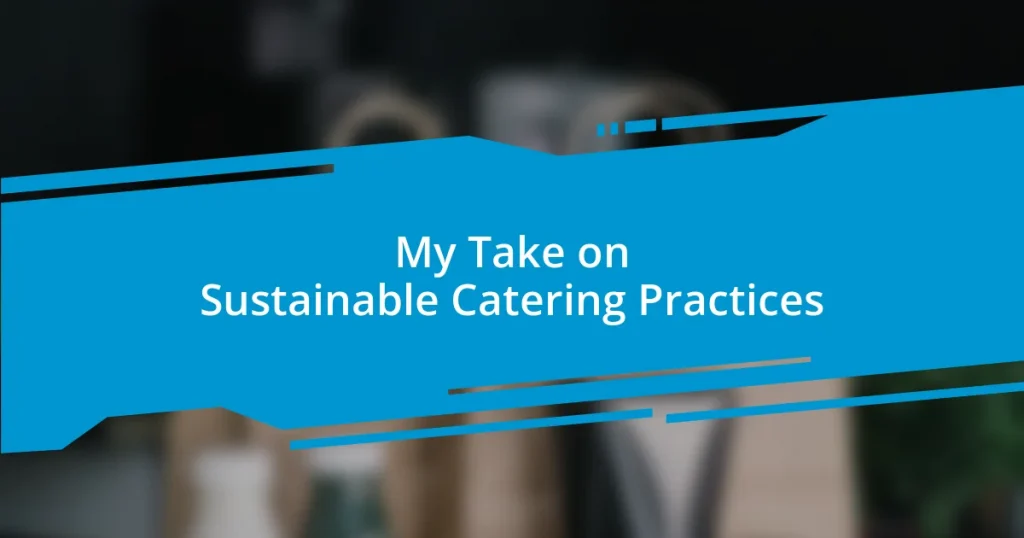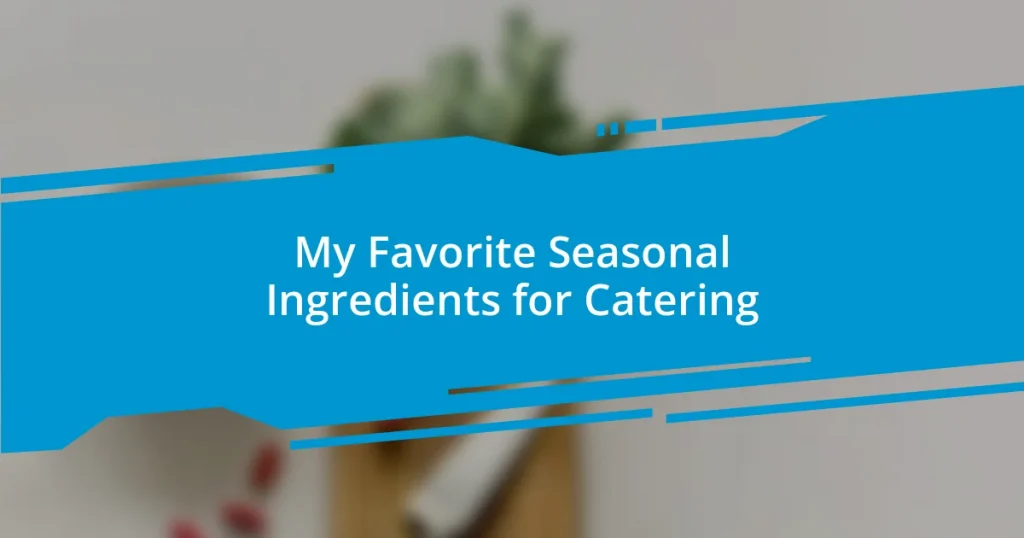Key takeaways:
- Understanding local health and safety regulations is crucial; engaging with local businesses and authorities significantly aids in compliance.
- Meticulous preparation of required documentation and following up on application processes can prevent delays and streamline obtaining a catering license.
- Post-approval, maintaining compliance through regular training, documentation, and staff involvement is essential for ongoing success in the catering business.
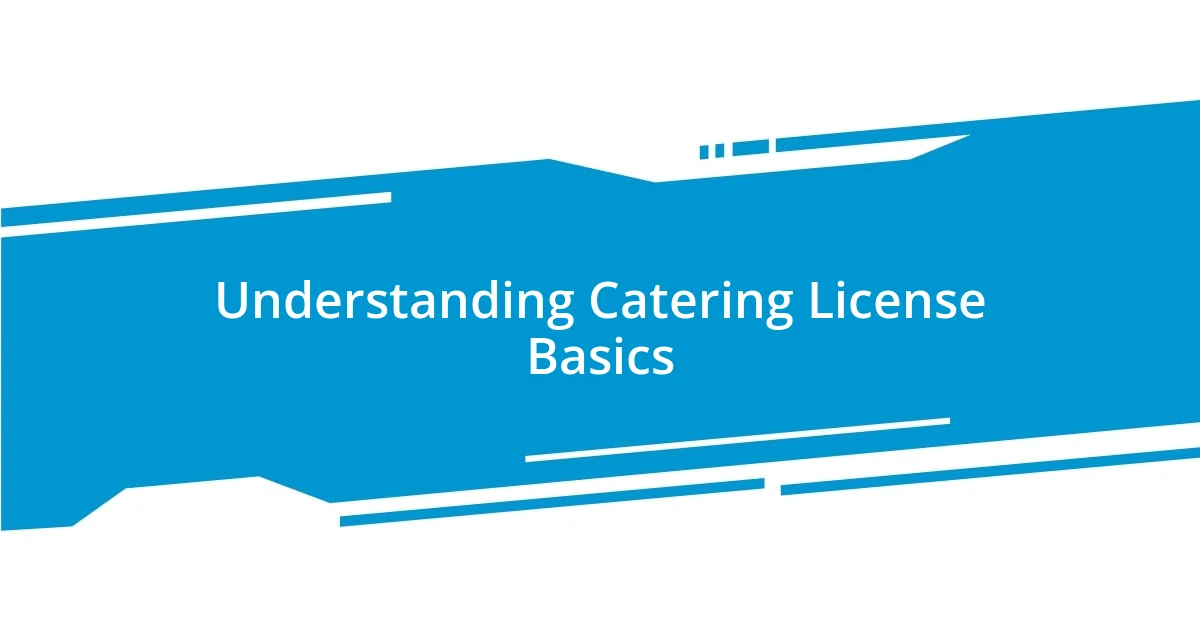
Understanding Catering License Basics
Understanding the basics of catering licenses can be a bit overwhelming at first. I remember diving into this world, feeling a mix of excitement and anxiety as I navigated the requirements. Each state has its own set of regulations, and this can often raise questions. Why does it feel like there’s a different rule for every corner of the country?
The heart of getting a catering license usually involves health and safety regulations, which are non-negotiable. Reflecting on my early days, I distinctly recall the moment I saw my first health inspection report. It was intimidating, but it sparked a deep appreciation for food safety standards. I realized that these guidelines are not just red tape; they’re designed to protect both the business and its customers.
Another key aspect is understanding the type of license required—be it a mobile catering license or one for a fixed location. This feels pivotal when planning your catering operations. I often pondered whether my business approach aligned with the type of license I needed. It’s crucial to match your catering style with the right license; otherwise, you could find yourself in a bind. Wouldn’t it be frustrating to invest time and resources only to discover you didn’t have the proper documentation?
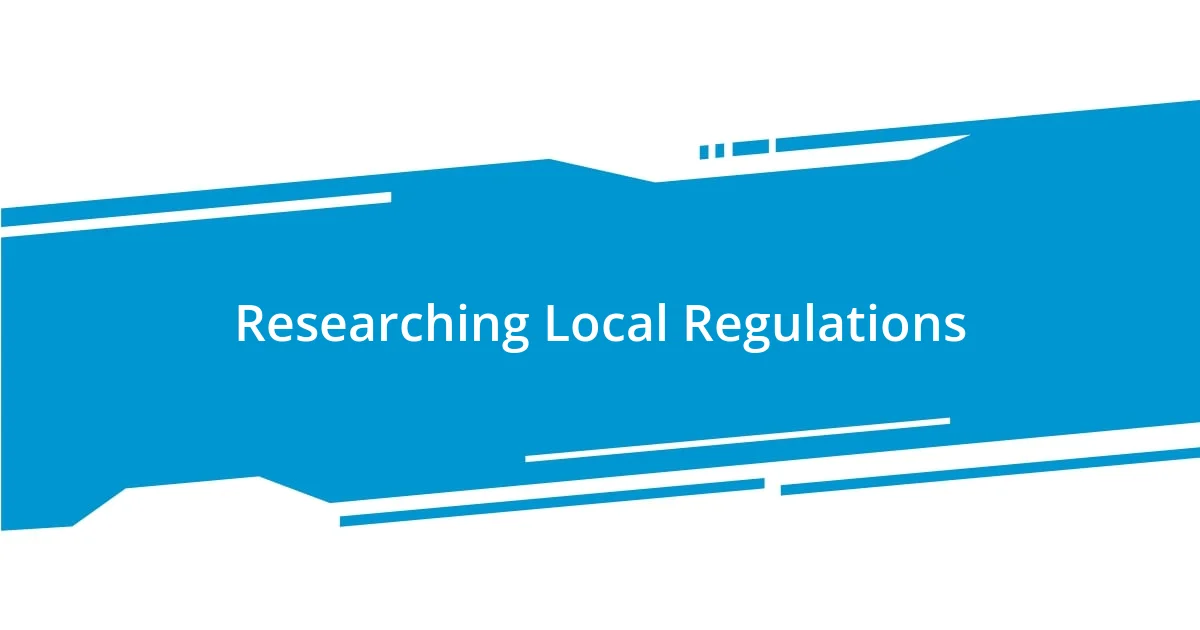
Researching Local Regulations
Researching local regulations can often feel like navigating a maze. When I first started, I remember feeling completely lost, wrestling with terms and nuances that seemed to change based on my locality. What I found most helpful was reaching out to local catering businesses. Their insights opened my eyes to the importance of knowing not just the laws themselves, but also the nuances in how they’re implemented in my area. Whether it was a minor point or a major regulation, local businesses provided a valuable perspective that papers and websites often missed.
One lesson I learned early on was to familiarize myself with both state and county requirements. I’ll never forget the moment I discovered that while state regulations were relatively straightforward, my county had additional rules. This often meant extra steps I hadn’t prepared for. I can honestly say that keeping a checklist of local regulations helped tremendously—it kept me organized and reduced a lot of stress. I often found myself revisiting that list, marking off items as I gained clarity.
Building relationships with local authorities proved invaluable too. I recall a particular instance when I attended a local health department meeting. There, I learned not only about the regulations but also got the chance to ask questions directly. Engaging with officials in a friendly environment helped demystify the regulatory process and ultimately made compliance feel less daunting.
| Regulation Type | Details |
|---|---|
| Health Regulations | Requirements for food safety and sanitation practices. |
| Business Licensing | Necessary permits depending on the scale and type of catering. |
| Insurance Requirements | Liability coverage that protects your business. |
| Special Events | Additional permits needed for catering at specific large events. |
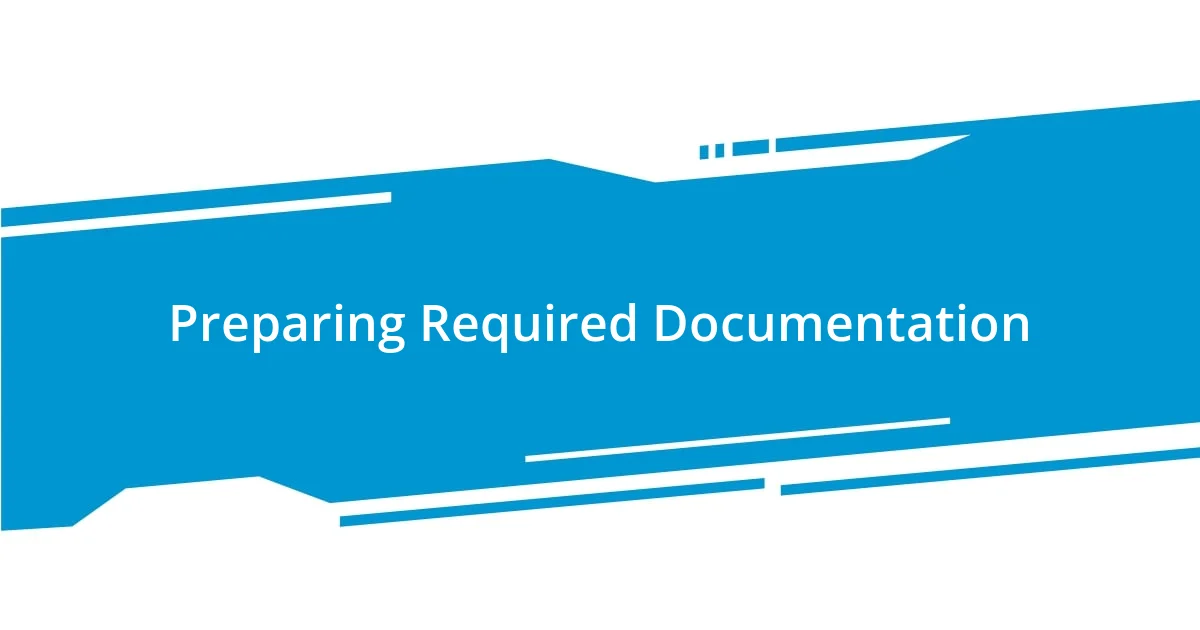
Preparing Required Documentation
Preparing the necessary documentation for a catering license can feel a bit like assembling a puzzle. I distinctly remember my first attempt at gathering everything I needed; it was a mixture of excitement and a bit of panic. The paperwork often felt daunting, but breaking it down into manageable pieces made the process less overwhelming. Here are the key documents you’ll likely need to prepare:
- Food Handler’s Permit: Ensures you and your staff understand food safety practices.
- Business License Application: Confirms your business is officially recognized.
- Liability Insurance Certificate: Protects against potential lawsuits.
- Health Inspection Reports: Validates that your kitchen meets local health standards.
- Catering Contract Templates: Sets clear expectations with clients for services provided.
As I sorted through the documents, I learned that organization was key. I even set up a dedicated folder on my computer, labeling everything clearly. This simple step saved me countless hours and heartaches in the long run. It’s essential to double-check each requirement for accuracy—one missing document can delay your application process. I recall the nervous anticipation leading up to submission day, but knowing I had everything in order made me feel confident stepping into that next phase of my catering journey.
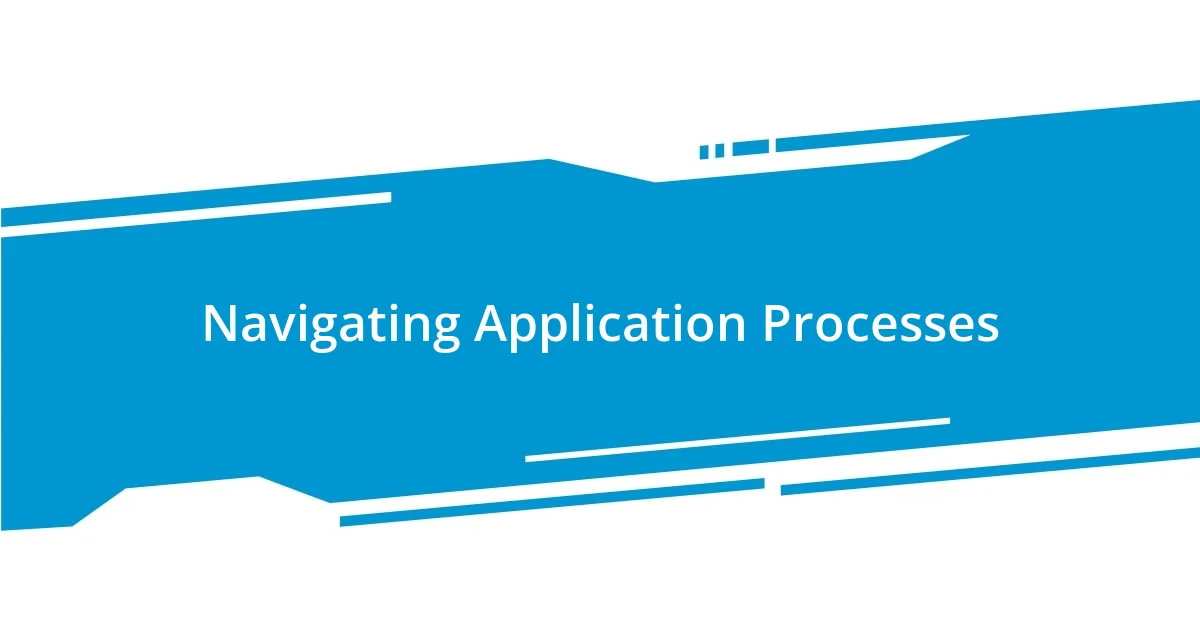
Navigating Application Processes
Navigating the application process for catering licenses can sometimes feel like trying to read a foreign language. I vividly remember staring at the application forms, feeling overwhelmed by the jargon. Each section seemed to carry its own hidden meanings, and my first instinct was to just close my laptop and walk away. However, I soon learned that taking it one step at a time made all the difference. Have you ever found yourself lost in a maze of paperwork? I realized that breaking down the application into bite-sized components allowed me to focus on one piece at a time—which turned a daunting task into a manageable series of steps.
Once I began filling out my applications, I discovered the importance of being precise and thorough. On my first try, I accidentally overlooked a small detail about submitting proof of kitchen inspections, which resulted in a frustrating delay. That experience taught me to double-check each requirement meticulously. I started using a checklist specific to my licenses, and trust me, there was nothing more satisfying than ticking off each completed item. In reflecting on that frustration, I now understand that being diligent upfront can save a lot of time and headache later.
I also found that following up on my applications was crucial in this process. After submitting my paperwork, I made it a point to reach out to the relevant office to confirm they had received everything. This small act not only eased my anxiety but also created a sense of connection with the officials. They’re people too, after all! During one of these calls, I even got some insider tips on expediting the approval process from a friendly clerk. Isn’t it funny how a little human interaction can turn a stressful task into an opportunity for camaraderie and understanding?
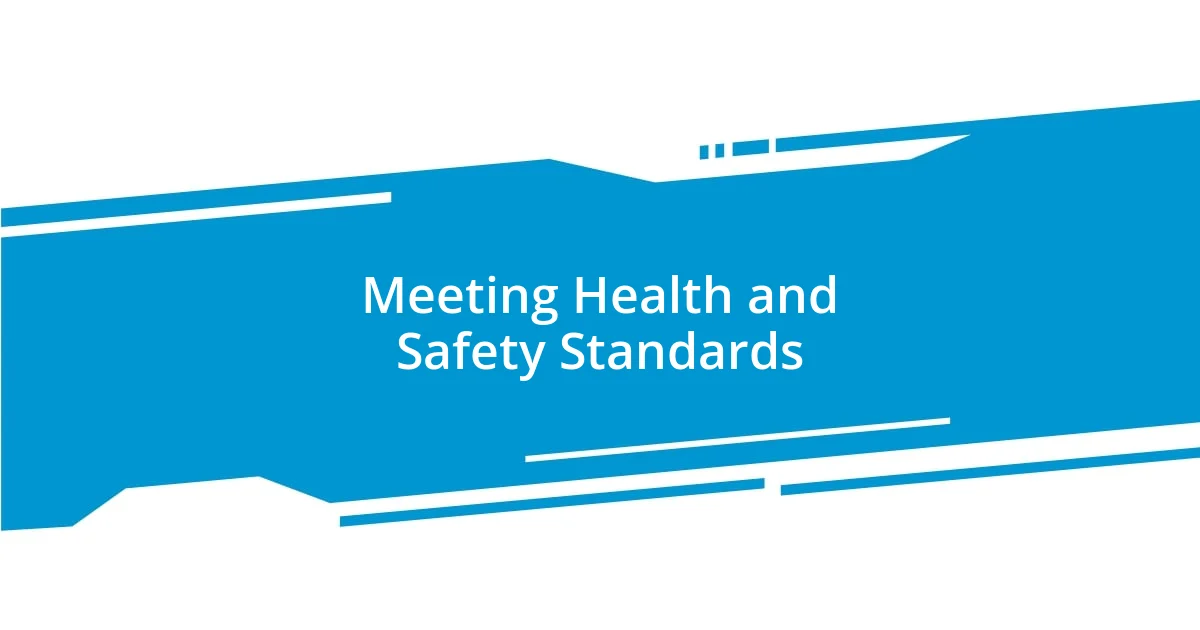
Meeting Health and Safety Standards
Meeting health and safety standards is non-negotiable in the catering world. I remember the first health inspection I faced; I was filled with a mix of excitement and anxiety. Ensuring my kitchen was spotless and my staff well-trained brought everything to life—a sort of culinary performance where the stakes felt incredibly high. I quickly learned that it wasn’t just about compliance; it was about pride in my work and commitment to my clients.
During my journeys, I became intimately acquainted with the often-overlooked details of food safety. I couldn’t believe how something as simple as properly labeling ingredients could dramatically change the way I operated. Questions like, “Is my food stored at the right temperature?” consumed my thoughts as I navigated through various regulations. This awareness turned my kitchen into a well-oiled machine, where every process felt efficient, organized, and tailored to meet health standards.
Moreover, I realized that keeping an open line of communication with health inspectors not only alleviated my fear but also enhanced my business practices. After one particularly intensive inspection, I found myself asking the inspector for feedback on improving processes. Their insights were invaluable and gave me the confidence to elevate my standards even higher. Have you ever thought about how feedback can transform the way you think about your business? For me, it was a wake-up call—one that highlighted that health and safety are ongoing commitments, not just items checked off on a list.
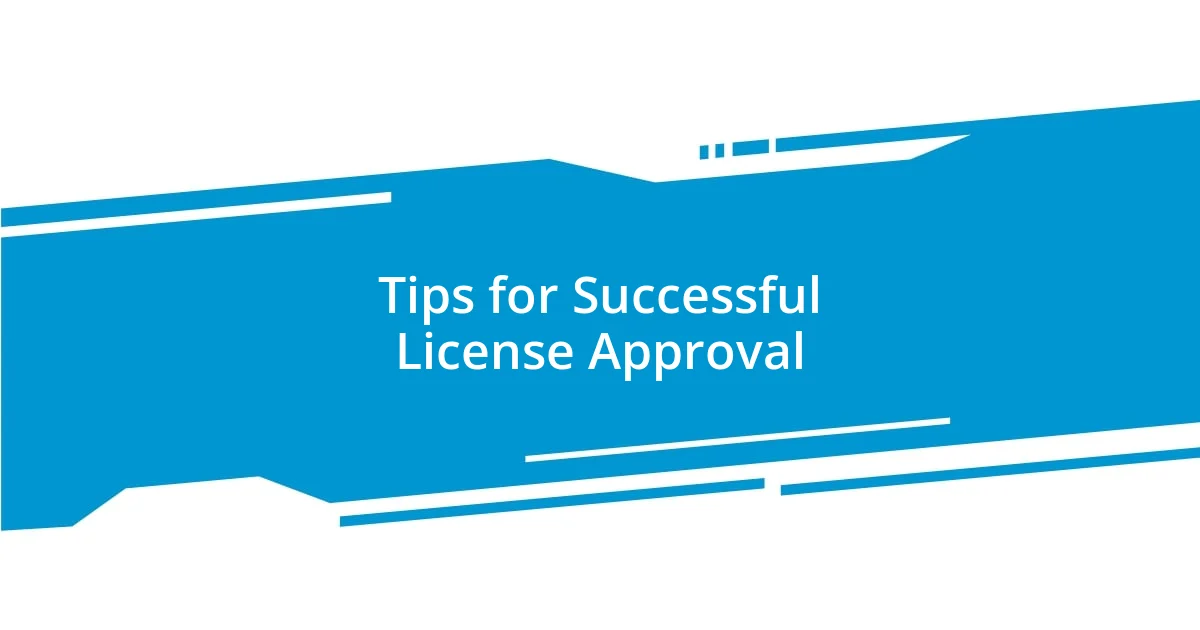
Tips for Successful License Approval
Securing a catering license can sometimes feel like jumping through hoops, but there are strategies to streamline the process. For instance, I discovered the importance of reaching out to local food service agencies early on. You wouldn’t believe how much clarity I gained by simply picking up the phone and discussing the nuances of the application with someone who had been there before. It felt like talking to a mentor, and that connection ultimately smoothed out several roadblocks I would have encountered alone.
One tip that really helped me was gathering all necessary documentation ahead of time. I remember creating a binder, meticulously filling it with copies of everything—from employee certifications to zoning permits. Sounds a bit over the top, right? But let me tell you, having everything in one place reduced a lot of last-minute stress and allowed me to focus on the bigger picture. Plus, I found it reassuring to know that I had all my ducks in a row as I submitted my application.
I can’t stress enough how crucial it is to stay organized throughout the approval process. I created a timeline for each stage of my application, and let me tell you, it was like having a road map. Each checkpoint motivated me, turning what felt like an overwhelming journey into a series of small victories. When obstacles arose, I’d look back at my accomplishments to remind myself of the progress I’d made. Can you relate to that feeling? Knowing that each step I took—no matter how small—brought me closer to the finish line made all the difference in maintaining my focus and enthusiasm.
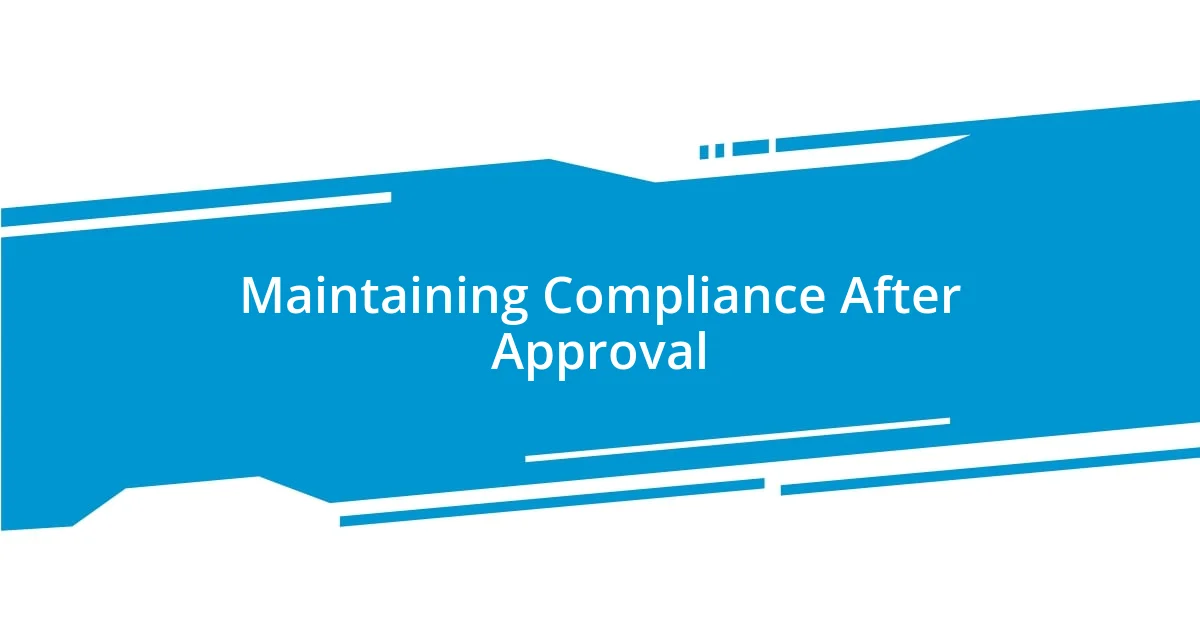
Maintaining Compliance After Approval
Staying compliant after your catering license is approved can feel like walking a tightrope. I remember celebrating the approval of my license, but soon realized that the real challenge was just beginning. Each month, I would set aside time to review local regulations and update my procedures accordingly—almost like a regular fitness check for my business. Have you ever felt that rush of fear when wondering if you’ve overlooked something essential? That urgency kept me vigilant and proactive.
Another thing I learned is the importance of ongoing staff training. I implemented monthly refresher courses, not just for compliance, but to foster a culture of accountability and excellence. After a training session, I often facilitated open discussions, inviting my team to share insights and experiences. This collaboration not only reinforced knowledge but also created a sense of shared responsibility—everyone was invested in our success. I’ve found that when your team feels empowered, it trickles down to every aspect of service, ensuring we consistently meet compliance standards.
Moreover, keeping detailed records became a game-changer for me. I started logging everything from employee training sessions to daily temperature checks in a digital format, which allowed for quick access during inspections. I used to dread when inspectors came knocking, but now I feel confident. It’s like having a secret weapon; knowing that I can quickly produce documentation reassures me that I’m on top of things. Does keeping meticulous records sound tedious? In my experience, it becomes second nature, and the peace of mind it brings is worth every minute spent!

